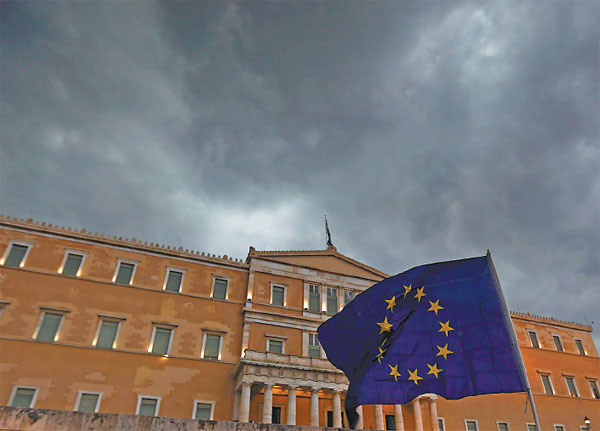Greece offers conditional OK to bailout
Germany skeptical of latest overture to resolve crisis, but Merkel says door is open
Greek Prime Minister Alexis Tsipras has written to international creditors saying Greece could accept their last bailout offer if some conditions were changed, but Germany expressed skepticism while saying the door was still open for negotiations.
In exchange, Athens asked for a 29 billion euro ($32.2 billion) loan to cover all its debt service payments due in the next two years.
In the letter, seen by Reuters, Tsipras asked to keep a discount on the value-added tax for Greek islands, stretch out military spending cuts, and delay the phasing out of an income supplement to poorer pensioners.
"As you will note, our amendments are concrete and they fully respect the robustness and credibility of the design of the overall program," the Greek leader wrote.
Eurozone finance ministers were due to discuss the Greek request in a conference call on Wednesday at 11:30 pm China time, but the initial reaction from ministers and senior officials was that the letter contained elements that ministers would find hard to accept.
German Chancellor Angela Merkel said Greece had not fulfilled its obligations, but added that the door for negotiations remained open.
With long lines forming at ATMs a day after Greece became the first advanced economy to default on the IMF, and with signs that supplies of bank notes were running low, Tsipras has been under growing political pressure to reach a deal.
Although his letter was dated June 30, it arrived after the 19 Eurogroup ministers had ended a conference call on Tuesday evening. An EU official said it was received around midnight, when the country's international bailout expired when it defaulted on an IMF repayment.
Greece "is prepared to accept this staff level agreement subject to the following amendments, additions or clarifications, as part of an extension of the expiring EFSF program and the new ESM loan agreement for which a request was submitted today," Tsipras wrote.
However German Finance Minister Wolfgang Schaeuble poured cold water on hopes for a rapid breakthrough, saying the letterhadcome too late and it was still not clear what Greecewanted.

"That did not provide further clarity," he said, adding that there was "no basis" for serious negotiations with Athens at the moment.
Any talks on a new program would have to start from scratch with different conditions, he told a news conference in Berlin.
With events moving quickly, it was unclear whether a referendum on the bailout terms, planned for Sunday, would still go ahead after Finance Minister Yanis Varoufakis indicated on Tuesday that it might be scrapped if a deal could be reached.
Advertising signs from the ruling Syriza party supporting "No" appeared in Athens, but the hardships of pensioners added to the pressure facing Tsipras, who has indicated he will resign if he loses the referendum.
The Tsipras letter contained only a single sketchy reference to labor market reform, which was one of the creditors' key demands to make the Greek economy more competitive.
Reuters - AP


|
A European Union flag waves in front of the Greek Parliament building, in Athens on Tuesday. |
|
A pro-euro demonstrator advocates a "Yes" vote. Reuters Photos |
(China Daily 07/02/2015 page12)
















